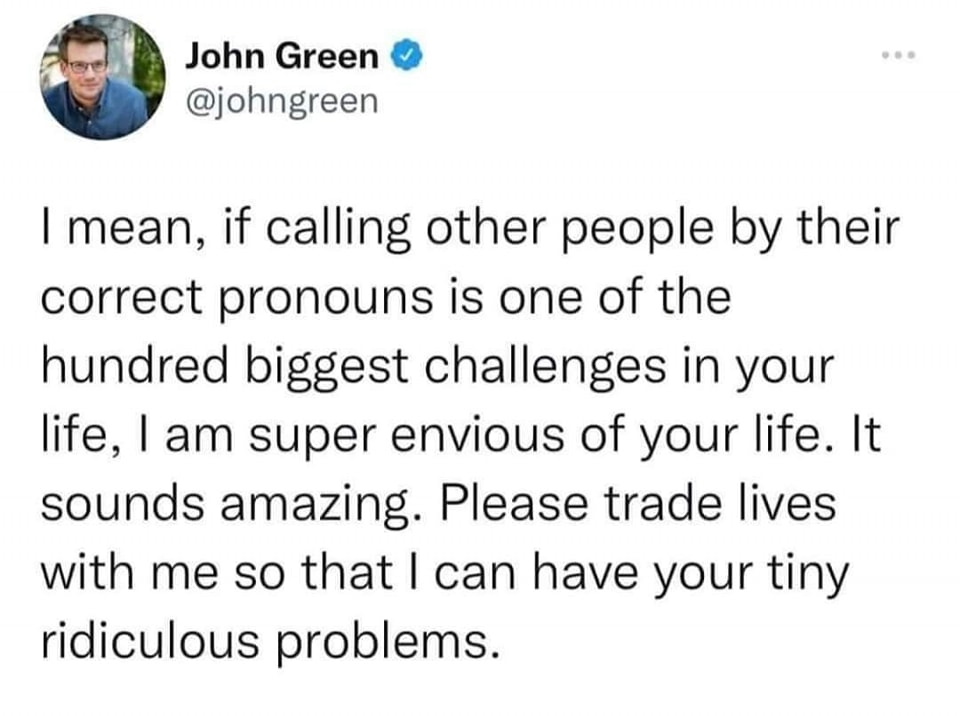this post was submitted on 28 Apr 2024
1546 points (92.3% liked)
Microblog Memes
6664 readers
4465 users here now
A place to share screenshots of Microblog posts, whether from Mastodon, tumblr, ~~Twitter~~ X, KBin, Threads or elsewhere.
Created as an evolution of White People Twitter and other tweet-capture subreddits.
Rules:
- Please put at least one word relevant to the post in the post title.
- Be nice.
- No advertising, brand promotion or guerilla marketing.
- Posters are encouraged to link to the toot or tweet etc in the description of posts.
Related communities:
founded 2 years ago
MODERATORS
you are viewing a single comment's thread
view the rest of the comments
view the rest of the comments

The thing about grammatical gender is that it doesn't really have much to do with sex or gender identity. In German, for instance, 'mädchen' (girl) is neuter. Gender in French is 98% assigned based on the pronunciation of the three final syllables. In Danish, living things tend to be 'common gender' and inanimate objects tend to be 'neuter'.
It'd be more accurate to call it 'noun classes' than gender.
And that's exactly what they're called in other languages like Hawaiian and Swahili.
Well, yes. But not for Indo-European languages which is... mostly a historical artifact. But we're still sticking to teaching traditional grammar using traditional terminology, which is super frustrating. Imagine if you kept teaching maths in a manner which you knew was fundamentally wrong, but it was just too much work to reeducate all maths teachers.
Well, as a German, I wouldn't agree. Generally, nouns describing men are masculine and nouns describing women are feminine. "Das Mädchen" is just an odd one out because it's the diminutive (always neuter in German) of "die Maid", which in turn is feminine.
Yes, this doesn't really apply to objects, but it mostly does for people.
Sure, there's some correlation - but when 99% of words in a noun class can't have a biological gender it seems weird to name it after the 1%.
Well, you're arguing terminology. But the original commenter's point was about the association of grammatical gender with gender, and that is definitely a thing in German.
Der Arzt (Male doctor) -> die Ärztin (female doctor) is an example where the grammatical gender changes with the gender of the person, and that's almost always the case.
Child - das Kind - grammatical gender: neuter. Referred to in context using the gender-neutral pronoun 'es' (it). The pronoun used correlates with the grammatical gender of the noun used, not the gender of the person referred to.
Eg Ein Kind lacht. Es hat etwas gesehen. (transl: A child laughs. He/she/they saw something.)
I know. But generally, the gender of the noun describing a person correlates with the gender of the person described strongly.
Ok but my point is that when it doesn't correlate, it becomes clear how grammatical gender is independent from the person's gender.
It becomes even clearer when you consider all nouns by definition have a grammatical gender - inanimate objects, abstract concepts, etc, even though the thing described clearly doesn't have a gender. Eg die Tür ist offen. Ich schliesse sie. (transl.: the door is open. I close it.) 'Sie' being the female pronoun used to refer to the grammatically female door.